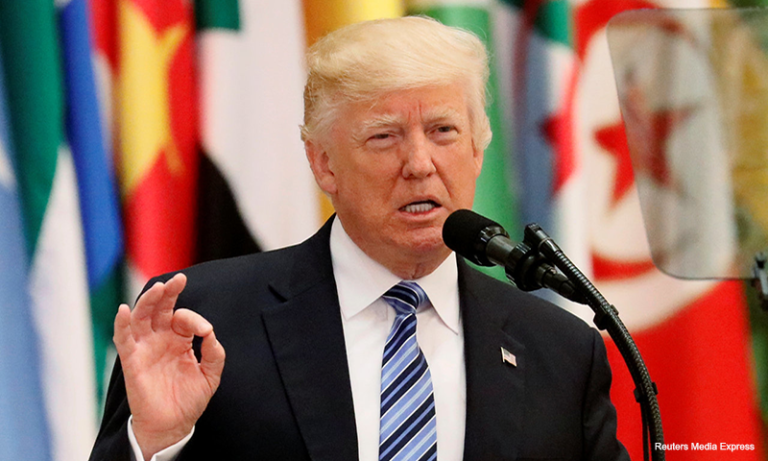
US President Donald Trump has embarked on his first foreign trip as president, visiting Saudi Arabia, Israel, Palestine, the Vatican, and some EU countries. During Trump’s visit to Saudi Arabia, he addressed 55 leaders of Arab and Muslim countries at an Arab Islamic American Summit and participated in the inauguration of the Global Center for Combating Extremist Ideology.
Despite his constant belligerence and Islamophobic rhetoric in the past, Trump was received with a very warm and festive welcome by Saudi Arabia and the Arab and Muslim leaders. He was also awarded the King Abdel-Aziz Al Saud Medal, the highest civilian honor in the kingdom. His unpredictability and unconventional conduct make him a perilous issue for world leaders, who are very wary of his impulsive temperament and short attention span. They go out of their way to pamper the president and keep him entertained in order to avoid potentially irascible reactions.
For his part, and in an effort to reset his reputation among the world’s 1.6 billion Muslims, Trump delivered a highly anticipated speech about tolerance and Islam. Many have hailed this speech as a turning point toward a more tolerant Trump. What new insights does this speech offer? Have Trump’s negative views of Islam shifted? Is the world now seeing a changed Donald Trump?
A Transformed Tolerant Trump? Hardly
Throughout his presidential campaign (and even prior), Trump waged a war against Islam. From his attacks against then-president Barack Obama accusing him of being Muslim, to his campaign rhetoric and promises, Trump has always made clear his negative views on Islam. Among cheers by his supporters, candidate Trump often branded his presidential campaign with demonizing Muslims, calling for surveillance of mosques and a Muslim registry, and demanding a “total and complete shutdown of Muslims entering the United States,” saying “it is obvious to anybody the hatred is beyond comprehension.” As president, Trump directed two failed attempts to realize his Muslim ban. Trump also banned Syrian refugees fleeing war and persecution, calling them “the greatest Trojan horse” of ISIL fighters.
Perhaps most profoundly, Trump made his famous “I think Islam hates us” remark during an interview with CNN in 2016. “There’s something there that—there’s a tremendous hatred there. There’s a tremendous hatred. We have to get to the bottom of it. There’s an unbelievable hatred of us,” he said.
One year later, in Saudi Arabia, Trump’s rhetoric shifted. Addressing the Muslim world, President Trump used softer language, almost successfully reading a prepared speech from a teleprompter. In one year, President Trump went from “Islam hates us” to calling Islam “one of world’s great faiths.” He even praised the region’s accomplishments and acknowledged that “more than 95 percent of the victims of terrorism are themselves Muslim.” He made sure to distinguish between Islam and terror, rejecting the clash of civilizations narrative and classifying it as “a battle between barbaric criminals who seek to obliterate human life, and decent people of all religions who seek to protect it. This is a battle between Good and Evil.”
Trump is no stranger to flip-flopping and reversing his campaign promises, but his about-face on Islam is perhaps the most prominent. He branded his presidential campaign by attacking Islam and Muslims in America and around the world, and insisted on using the term “radical Islamic terrorism” to underscore crimes committed by individuals of Muslim background as based on religious beliefs. His speech in Riyadh attempted to use a different language, “Islamist extremism,” yet it still singled out Islam as the source of violent extremism.
While some of Trump’s more tolerant remarks on Islam represent a slight but welcome and positive change, whether he means it or not, Trump’s speech was clearly designed for a Muslim audience. While US policy remains essentially the same and candidate Trump and President Trump are two sides of the same coin, it is yet to be seen whether he will change his rhetoric again once he returns to the United States and addresses his voter base and supporters. After years of incendiary remarks against Islam and Muslims, Trump is unlikely to have had a true change of heart. One rehearsed speech cannot erase years of hatred and incitement, despite the apparent love fest between Trump and Muslim leaders in Saudi Arabia.
The Verdict on “Radical Islamic Terrorism”
Trump has repeatedly criticized President Barack Obama for refusing to use the term “radical Islamic terrorism,” insisting that “anyone who cannot name our enemy is not fit to lead this country.” Even days before leaving for his trip to the region, on May 17, Trump used the phrase saying, “We have to stop radical Islamic terrorism.” He then vowed to speak with Muslim leaders in Saudi Arabia and “challenge them to fight hatred and extremism and embrace a peaceful future for their faith.”
This emphasis and insistence on “radical Islamic terrorism” is more than just rhetoric. Trump has continuously asserted his views that terrorism is Islamic and an attribute of Islam. His 33-minute Riyadh speech reportedly went through five drafts before seeing the light, with an ideological battle between advisor and speechwriter Stephen Miller (also known as the architect and public face of the “Muslim ban”) and National Security Advisor H.R. McMaster, who was reported as saying the use of “radical Islamic terrorism” is “counterproductive.” In his speech, Trump was supposed to use the slightly different phrase “Islamist extremism,” but ended up including both. Going off script toward the end, he said, “That means honestly confronting the crisis of Islamic extremism and the Islamists and Islamic terror of all kinds.” This was quickly attributed by White House aides to his exhaustion, on the second day of the trip.
With a polished diplomatic speech, President Trump’s only mishap is a significant mistake. When “exhausted,” he slipped back to equating Islam with terror. Although some analysts consider the mere attempt to use “Islamist extremism” instead of “radical Islamic terrorism” a display of tolerance, both terms associate Islam as a religion with violence and terrorism. Trump as well as most of his cabinet members still believe that terror is religious and not political. He placed the sole responsibility of fighting global terror on Arab and Muslim nations while disregarding the role of the United States and its abuses in fueling the creation of ISIL in Iraq. Trump said, “Muslim majority countries must take the lead in stamping out radicalization,” and they “cannot wait for American power.” “Drive out the terrorists, drive out the extremists,” he admonished.
After claiming he is “not here to lecture,” Trump went on to list what Arab and Muslim countries should do and spoke about the responsibility of clerics to guide Muslim populations away from terrorism. He even told religious leaders what to say to young Muslims: “If you choose the path of terror, your life will be empty, your life will be brief, and your soul will be condemned.”
A Strategy for Countering Violent Extremism
Despite some subtle changes in terminology, President Trump’s remarks maintain the notion that terrorism is driven by Islam as a religion, without a single reference to the role of such factors as human rights and democracy in Arab society. While Trump spent a significant proportion of his visit in Saudi Arabia preaching tolerance and unity in the fight against terrorism, he spent the rest of his time there—ironically—signing a $110 billion arms deal, as part of a 10-year package of $350 billion in economic and defense investment.
As candidate, Trump criticized Saudi Arabia on Facebook for wanting “women as slaves” and “killing gays,” and attacked Hillary Clinton for accepting money from the Saudis. Despite the kingdom’s grave human rights abuses and its reputation for preaching and exporting an intolerant interpretation of Islam (Wahhabism), the Trump Administration was completely silent on these issues during the president’s trip to Saudi Arabia.
Speaking from the “central heartland of the Muslim world,” Trump placed the full responsibility of violent extremism in Middle East hands, not accounting for the role of the United States in Iraq and Libya and its longstanding support for dictators and their human right abuses.
Research has consistently shown that authoritarian systems that violate human rights lack democratic governance, which essentially limits economic opportunities and freedoms for young people in the region and thereby contributes greatly to the rise of violent extremism. Secretary of State Rex Tillerson even told Fox News Sunday that the focus on fighting terrorism and deterring Iran will improve the state of human rights in Saudi Arabia. President Trump completely ignored the grievances and marginalization that fuel despair and a turn to violent extremism; instead, he facilitated the sale of more weapons and remained silent on civil and human rights.
Additionally, while focusing on countering violent extremism (or “terrorism”) and deterring Iran as a way “to advance security and stability across the Middle East,” in the final analysis, Trump’s speech might actually encourage terrorism. During his Iran-bashing tour, Trump almost incited against the Shia population in the region and fueled intolerance and sectarianism, since many Arab countries have significant Shia populations. As he was preoccupied with the fight against terrorism and deterring Iran as a major sponsor of terrorism and cause of instability, Trump failed to provide a specific strategy to address these two threats.
As the first president to visit Saudi Arabia on his first foreign trip, Trump made the priorities of his administration very clear: support for the status quo, military spending, and disregard for human rights. The important role of human rights, democracy, and justice in stability and security has been routinely ignored by successive US administrations, but this time President Trump did not only ignore them in practice but also in preaching and rhetoric. Despite apparent changes in terminology, Trump’s tone on Islam and terrorism arguably remains unchanged.

